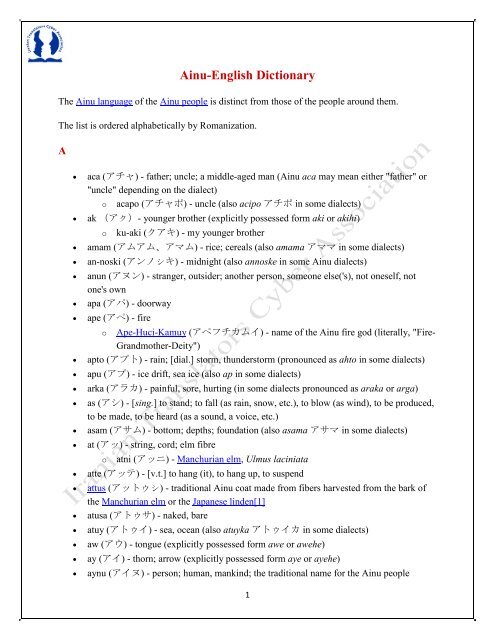Ainu-English Dictionary
Ainu-English Dictionary
Ainu-English Dictionary
Create successful ePaper yourself
Turn your PDF publications into a flip-book with our unique Google optimized e-Paper software.
Iranian Translators Cyber Association DictionariesoAynu-Mosir (アイヌモシㇼ) - the land of humans; the earthC• cape (チャペ) - cat (cf. Aomori, Akita, and Yamagata Japanese dialects chape ちゃぺ orchappe ちゃっぺ "cat")• caranke (チャランケ) - appeal (n)• casi (チャシ) - fence; enclosure; fortress, castle• cep (チェプ) - fish, salmon (also ciep チエプ in some dialects)• ci (チ) - penis, a male's private parts (explicitly possessed form ciye or ciyehe)• cikap (チカプ) - bird, [esp.] owl (cf. Chikap Kamuy)• cip (チプ) - canoe, boat, ship• cir (チリ) - bird• cironnup (チロヌッㇷ゚) - fox• cis (チシ) - to cry, to weep, to howl• cise (チセ) - house/home• ciw (チウ) - tide; current (of a stream, a river, or the sea); wave(s)• ciw (チウ) - to stab, to pierce• cuk (チュㇰ) - autumn• cup (チュプ) - luminary, sun, moon; monthE• emusi (エムシ) - sword• erum (エルム) - mouse, rat (sometimes also erem エレム)• esaman (エサマン) - otter• etu (エトゥ) - nose; beak; a projecting tip of anything, the end (of a projecting part)H• ham (ハム) - leaf• hanke (ハンケ) - near• hanku (ハンク) - navel (dialectal variants include hankapu ハンカプ, hankapuyハンカプイ, hanka ハンカ, hanko ハンコ)• hapo (ハポ) - mother• harki (ハリキ) - left ( 左 ) (dialectal variants include harke ハリケ)o harki-sam (ハリキサム) - left side2
• haw (ハウ) - voice (explicitly possessed form hawe ハウェ or hawehe ハウェへ)• hemanta (へマンタ) - what? (dialectal variants include hemata へマタ)• hempakpe (ヘンパクペ) - how many (things)?• hese (ヘセ) - to breathe; to sigh• hok (ホク) - to buy (dialectal variants include hoh ホフ)• hoku (ホク) - husband (explicitly possessed form hokuhu; dialectal variants includeoku(hu))• hom (ホム) - a knot (in wood); a joint (of bamboo)onihom (ニホム) - a knot in wood, a knot in a tree (explicitly possessed formnihomi ニホミ; in some dialects, the two morphemes that compose thiscompound are maintained as separate words, i.e. ni hom instead of nihom)o tophom (トプホム) - a joint of bamboo (in some dialects, this form is maintainedas two separate words, i.e. top hom instead of tophom)• hon (ホン) - belly, abdomen, stomach (explicitly possessed form honi ホニ or honihiホニヒ)• huci (フチ) - grandmother; old woman• humpe (フンペ) - whale• hure (フレ) - (to be) redI• inaw (イナウ) - sacred shaved stick, symbolizing a bird,used for prayer [2]• iomante (イオマンテ) - the <strong>Ainu</strong> bear festival [3](sometimes pronounced as イヨマンテ iyomante, イヨマンデiyomande, etc.; from i- ("it, something, someone," a prefix forvaguely indicating the object of a verb) + oman (to go) + -te(causative suffix))• ipe (イペ) - [v.i.] to eat, to have a meal; [n.] fish(especially the likes of salmon, trout, or sturgeon)o somo ku-ipe na (ソモ クイペ ナ) - I won't eat.• ipetam (イペタㇺ) - legendary <strong>Ainu</strong> sword [4] (literally,the "eating blade" or the "blade that eats (people)")• ironne (イロンネ) - thick (as a flattish object)• isam (イサㇺ) - not to exist, not to be, not to have; to begone, not to be there anymore; to die (semantically equivalent toJapanese 無 い, なくなる, or (~て)しまう)3
Iranian Translators Cyber Association Dictionaries• isepo (イセポ) - rabbit, hare (イソポ isopo in some dialects)• itak (イタㇰ) - language• iwaw (イワゥ) - sulfur (cf. Japanese iō ( 硫 黄 ) "sulfur")K• kam (カム) - meat, flesh (explicitly possessed form kami or kamihi)• kamuy (カムイ) - god, spirit; bear• Kamuy-Kara-Puto-Ya-Mosir (カムイカラプトヤモシㇼ) - supposedly means "mouth ofwater"; refers to Karafuto, or the mouth of the Amur River• Kamuy-Mosir (カムイモシㇼ) - "Land of the Gods"; heaven• kamuy-nomi (カムイノミ) - to pray to the gods• kanna (カンナ) - upper, above• kanto (カント) - sky, heaven• kap (カプ) - skin, fur, rind, peel, bark, outer covering of anything (explicitly possessedform kapu or kapuhu)o kapkar (カプカラ) - to skin, to peel, to remove the rind, to strip the bark• kapap (カパプ) - bat (the flying mammal)• kapar (カパラ) - thin (as a flattish object)• kapiw (カピウ) - seagull• kar (カラ) - to make, to prepare, to produce, to do• karku (カㇻク) - nephew• karus (カルシ) - mushroom• kawkaw (カウカウ) - hail, sleet• kem (ケム) - bloodoookemnu (ケㇺヌ) - to bleedkemorit (ケモリッ) - a blood vessel; a vein or an artery (also kemrit ケムリッ)kemus (ケムシ) - bloody, covered in blood, having blood all over• kem (ケㇺ) - shortage of food, famine, hunger, starvationoookemekot (ケメコッ) - to starve to death, to die of hungerkemnoye (ケㇺノイェ) - to starve to death, to die of hungerkemus (ケムシ) - famished, starving; there is/was a famine• kem (ケㇺ) - a needleokemeyki (ケメイキ) - to do needlework, to sew• ker (ケレ) - footwear, shoe, boot (explicitly possessed form ケリ keri)• kera (ケラ) - taste, flavor4
• kes (ケシ) - end (explicitly possessed form ケセ kese or ケセへ kesehe)• kes- (ケシ) - every (day, year, etc.)• ki (キ) - to do• ki (キ) - louse• kikir (キキリ) - bug, insect, worm• kim (キム) - mountain• kina (キナ) - grass, herb, (edible or otherwise useful) plant; a kind of mat woven fromdried bulrush leaves with decorative patterns executed in cotton cloth• kira (キラ) - to run away, to flee• kiraw (キラウ) - horn, antler (explicitly possessed form kirawe キラウェ or kiraweheキラウェへ)• kiray (キライ) - comb• kiror (キロロ) - strength, power, ability• kisar (キサラ) - ear• kitay (キタイ) - top of anything; summit, peak (of a mountain); roof (of a house)• konci (コンチ) - hat• konru (コンル) - ice; [dial.] hail; [dial.] sleet• kor (コロ) - to hold; to have• kore (コレ) - to give (probably from the causative form of <strong>Ainu</strong> kor "to hold; to have,"i.e. *kor-de > kor-e "to cause to hold; to cause to have" > kore "to give")• Korpokkur (コロポックル) - name of a traditional <strong>Ainu</strong> folktale [5]• kotan (コタン) - village, settlement; dwelling placeo Kamuy-Kotan (カムイコタン) - Kamuikotan, a scenic area located in the valleyof the Ishikari River (literally, "dwelling place of (a/the) god")• ku (ク) - bow• ku (ク) - to drink; to smoke (tobacco, etc.)• kumi (クミ) - moldokumius (クミウシ) - moldy, rotten and covered in mold• kunki (クンキ) - nail (cf. Japanese 釘 kugi)• kunne (クンネ) - black; darkookunnecup (クンネチュプ) - the Moon (literally, "Black Luminary")Kunashir (クナシリ) - Black (Is)land. Present day Kunashir Island.• kur (クル) - shadow• kur (クル) - person; man, husband (cf. Korpokkur)• kut (クッ) - belt, girdle, waistband (explicitly possessed form クチ kuci or クチヒkucihi)5
Iranian Translators Cyber Association Dictionaries• Kutune-Shirka (クト゜ネシリカ) - name of a sacred <strong>Ainu</strong> epic [6]M• makiri (マキリ) - knife• mame (マメ) - bean or pea, pulses, legumes• mata (マタ) - winter (also known as the "men's season" for the fact that it is a goodtime of year for men to hunt for furs)o mata-noski (マタノシキ) - midwinter• mat (マッ) - wife; woman; [as prefix] female (explicitly possessed form マチ maci orマチヒ macihi)omatne (マッネ) - female• matak (マタㇰ) - younger sister (from an elder sister's point of view)oa-mataki (アマタキ) (Classical), ku-mataki (クマタキ) (Colloquial), ku-kormatak (クコロ マタク) - my younger sister (said by an elder sister)• matkaci (マッカチ) - girl• matkarku (マッカㇻク) - niece• mean (メアン) - (to be) cold (as the weather)omeekot (メエコッ) - to freeze to death; to starve due to frigid weather• mem (メム) - spring, pool, a place where clear water wells up• menoko (メノコ) - woman• mici (ミチ) - father (in some <strong>Ainu</strong> dialects, mici is formal and means something like"dead father" or "ancestor"; such dialects typically use aca in the regular meaning of"father")• mina (ミナ) - to laugh• mokor (モコロ) - to sleep• mori (モリ) - small hill, hillock, slope (cf. Japanese mori "forest; [dial.] Shinto shrine,sacred grove, holy place; [dial.] hill")• mosir (モシㇼ) - land; territory; island• moyuk (モユク) - tanuki• mukkuri (ムックリ) - traditional <strong>Ainu</strong> Jew's harp• mun (ムン) - grass, weed, (useless) plant• munin (ムニン) - rotten• muy (ムイ) - winnow (cf. Japanese mi "winnow")N6
• nan (ナン) - face (explicitly possessed form nanu ナヌ or nanuhu ナヌフ)onanuwen (ナヌウェン) - ugly (literally, "its face is bad")nanuwen-cep (ナヌウェンチェプ) - sea raven, shaggy sculpin,Hemitripterus villosus• nanna (ナンナ) - mother (nanna was used in Sakhalin dialects; the variant nonno ノンノwas used by the Kuril Islands <strong>Ainu</strong>)• nay (ナイ) - dale, valley (esp. one which has a stream or a marsh); stream, river• ni (ニ) - tree; woodonitay (ニタイ) - woods, forest• nis (ニシ) - sky, heaven, air; cloudoniskur (ニシクル) - cloud• nispa (ニㇱパ) - a wealthy person, a rich man, the rich; a gentleman, a lord, a master; anhonorific title for a man, Mr.• nonno (ノンノ) - flower• noski (ノシキ) - middle, center (variants include noske ノシケ)• not (ノッ) - chin; cape, promontory• noto (ノト) - calm (of the sea, etc.), lull (dialectal variants include neto ネト)• nupe (ヌペ) - tears• nupek (ヌペク) - light (dialectal variants include nipek and nikep; explicitly possessedform nupeki, nipeki, nikepihi, etc.)• nupuri (ヌプリ) - mountain• nusa (ヌサ) - a word that collectively describes an altar and the many inaw (a shavedstick used in an offertory ceremony) that decorate itO• ohaw (オハゥ) - ohaw, <strong>Ainu</strong>-style stew• oman (オマン) - [sing.] to go• omap (オマプ) - to love (one's child, etc.), to cherish, to hold dear (c.f. Japaneseomou, which means "to think (that), to consider, to feel; to recall, to recollect, toremember; to imagine, to think of, to think about; to worry (about), to care (about), tolove")• onkami (オンカミ) - worship/prayer/beseechment (cf. Japanese ogami, which has thesame meanings)• ota (オタ) - sand; sandy plain, sandy place, beachP7
Iranian Translators Cyber Association Dictionaries• para (パラ) - wide (cf. Sapporo, Paramushir, Toyohara (Toyopara), etc.)• pasuy (パスイ) - chopsticks (cf. Japanese *pasi > hashi "chopsticks")• paykar (パィカㇻ) - spring (season)• pe (ペ) - water (especially that which is non-potable, not intended for drinking, or ladenwith much dissolved or suspended matter), moisture, sap, juice (explicitly possessed formpehe ペヘ)• peko (ペコ) - cow, cattle (cf. べこ beko "cow, cattle" in various Japanese dialects)• pene (ペネ) - thoroughly rotten, soft with decay, rotten and sticky or slimy• pet (ペッ) - river• pi (ピ) - seed, kernel, pip; pebble (as on a riverbed), small stone (explicitly possessedform piye ピイェ or piyehe ピイェヘ)• pinne (ピンネ) - male• pirka (ピリカ) - good, nice, fine, beautifuloooo• pok (ポク) -opirka kur (ピリカクル) - a fine man (in the sense of "a good person, avirtuous person")pirka okkay (ピリカオッカィ) - a fine man (in the sense of "a handsome man,a good-looking man")pirka menoko (ピリカメノコ) - a beautiful woman, a fine young ladypirka pa (ピリカパ)- a good yearpokna (ポクナ) - lower, under, below, beneath• pok (ポク) - vulva, a female's private parts (explicitly possessed form poki or pokihi)• pon (ポン) - small, little• pone (ポネ) - bone (cf. Japanese *pone > hone "bone")• poro (ポロ) - big, large• poru (ポル) - cave, hole (in rock, etc.)• poyna (ポイナ) - rock, stone (esp. one that is large)• pu (プ)- an elevated structure in which to store food and other valuables (thetraditional <strong>Ainu</strong> equivalent of a shed or a warehouse)• pukusa (プクサ) - a kind of wild plant that is prized by the <strong>Ainu</strong> for its pungent, garliclikeflavor (known in Japanese as <strong>Ainu</strong> negi "<strong>Ainu</strong> onion" or gyōja ninniku "wanderingascetic garlic")R• ram (ラム) - mind, heart (in the figurative sense), soul; understanding, intellect8
• ramat (ラマッ) - soul, spirit; meaning (of a word, etc.) (explicitly possessed form ramaciラマチ)• ray (ライ) - to dieoocupray (チュプライ) - eclipserayke (ライケ) - [sing. obj.] to kill (one thing), to cause (a singular object) to die• re (レ) - name (explicitly possessed form レヘ rehe)• rera (レラ) - wind• retar (レタラ) - white• ri (リ) - high, tall, lofty• repun (レプン) - in the offing, offshore, out in the sea (cf. Rebun Island)orepunkamuy (レプンカムイ) - god of the sea; orca; (in Samani dialect) whale• ruyanpe (ルヤンペ) - rain; [dial.] stormS• sak (サク) - summer (also known as the "women's season" for the fact that it is a goodtime of year for women to cultivate plants or to gather wild botanical resources)• sampe (サンペ) - heart, cardiac organ• san (サン) - to go down, to descend; to flow along (as a river)osanke (サンケ) - to send down, to cause to go down• sapanpe (サパンペ) - men's ceremonial <strong>Ainu</strong> crown [7]• sar (サラ) - tail (explicitly possessed form sara サラ or saraha サラハ)• sayo (サヨ) - sayo, <strong>Ainu</strong>-style porridge• seta (セタ) - dog (recent dialectal variants include sita シタ; early records of the <strong>Ainu</strong>language also contain other variant forms of this word for "dog," such as sta, heta, andhida)• sik (シク) - eye (explicitly possessed form siki or sikihi)• sikotan (シコタン) - Pleasant Village (present day Shikotan island)• sinep (シネプ) - one (thing)• sinrit (シンリッ) - root (of a tree, etc.); (ancestral) roots, bloodline, pedigree• sippo (シッポ) - salt• sir (シリ) - weather; appearance; status, condition• sir (シリ) - land; islandosir etok (シリ エトク) - the end of the Earth; the Shiretoko Peninsula• sir (シリ) - mountain9
Iranian Translators Cyber Association Dictionaries• sisam (シサㇺ) - Japanese (or assimilated <strong>Ainu</strong>s); (more generally) any foreigner, non-<strong>Ainu</strong>s (cf. Nivkh /sezam/, /sizm/ "Japanese"; probably originally from <strong>Ainu</strong> si- "self(reflexive prefix)" + sam "near by, close to; side" or <strong>Ainu</strong> si- "self (reflexive prefix)" +isam "not to exist, not to be, not to have")o hure-sisam (フレシサㇺ) - Russian; (more generally) European (from <strong>Ainu</strong> hure"red" + sisam "Japanese; foreigner")• sitoki (シトキ) - glass-bead necklace with a medallion• siw (シウ) - bitter• siwnin (シウニン) - blue, green, yellow• so (ソ) - waterfall, cascade• soy (ソイ) - outside (also used as a postposition, e.g. cise-soy "outside of a house,""outside the house")o soytao soyke• suma (スマ) - stone• sumari (シュマリ) - fox• susam (スサム) - shishamo• susu (スス) - willowT• takahka (タカッカ) - crab (Sakhalin <strong>Ainu</strong>)• tamasay (タマサイ) - beaded necklace worn by women• tanne (タンネ) - long• tap (タプ) - shoulder, arm• tek (テク) - hand, arm (explicitly possessed form teke or tekihi)• teyne (テイネ) - (to get) wet, damp• tomari (トマリ)- Shelter (Tomari city in Aomori)• tonkori (トンコリ) - traditional Sakhalin <strong>Ainu</strong> stringed instrument (cf. Nivkh tynryn, atraditional stringed instrument of the Nivkhs)• to (ト) - dayotanto (タント) - today• to (ト) - lake, pond, puddle• tom (トム) - to shine, to sparkle, to twinkleoootomte (トムテ) - to cause to shinetom tom (トムトム) - sparkling, twinkling, glowing, flashingtonnatara (トンナタラ) - brilliant, resplendent, shining10
• tompi (トムピ) - light, brilliance, sparkle, glow• top (トプ) - bamboo• topa (トパ) - flock, herd (usually appears in the explicitly possessed form topaha トパハ"a flock of ~," "a herd of ~")• toy (トィ) - earth, soil, dirt, mud (also occasionally reduplicated for expressive effectto produce toytoy)• tunakay (トゥナカイ) - reindeer (borrowed into Japanese as トナカイ tonakai; also cf.Nivkh tlaŋi 'reindeer')• tukar (トゥカラ) - seal (i.e. a sort of marine Pinniped; also tukkar, tukoro, or tokkari insome dialects)• tuki (トゥキ) - (drinking) glass, [esp.] a saké cup (cf. Japanese 杯 sakazuki "a vesselfrom which one drinks an alcoholic beverage," from Old Japanese sake "alcoholicbeverage" + tuki "drinking vessel")• tuntu (トゥントゥ) - pillar, column; post, stake• tur (トゥル) - dirt, grime, filthooturtur (トゥルトゥル) - dirt, grime, filthtursak (トゥルサク) - pure, clean, unsullied• tus (トゥシ) - (a man's) concubine, (a woman's) fellow wife• tusa (トゥサ) - to be cured, to heal up, to recover (from an illness)otusare (トゥサレ) - to cure, to heal• tusir (トゥシリ) - grave, tomb; graveyard, cemeteryU• umma (ウンマ) - horse (cf. Japanese うま uma "horse")• upas (ウパㇱ) - snow• utari (ウタリ) - friend/companion/compatriot; used by the <strong>Ainu</strong> to describe themselves;the politically correct term for the <strong>Ainu</strong> people.W• wakka (ワッカ) - water (especially that which is potable or clean) (cf. Wakkaus Kamuy,the goddess of fresh water)• wen (ウェン) - bad; cruel; poorooowenkur (ウェンクㇽ) - a pauper, a poor personwenpe (ウェンペ) - a bad one; a bad thing; a bad person, an evil person, a villainwenpekur (ウェンペクㇽ) - a bad person, an evil person, a villain11
Iranian Translators Cyber Association DictionariesY• ya (ヤ) - net• ya (ヤ) - land (as opposed to sea, river, etc.), shore, (river)bank• yuk (ユク) - deer• yam (ヤム) - cold (to the touch)• yam (ヤム) - chestnut• yup (ユプ) - older brother (explicitly possessed form yupi or yupihi)o yupo (ユポ) - older brother (dialectal variants include yuppo and yuhpo; probablyfrom an earlier */yup-po/ < /yup/ "older brother" + /po/ "small; diminutivesuffix")• yukar (ユーカㇻ) - traditional <strong>Ainu</strong> sagasReferencesMost of the content of this page was taken from the equivalent Japanese-language article,accessed March 27, 2006.See also<strong>Ainu</strong>-<strong>English</strong> <strong>Dictionary</strong>12
















